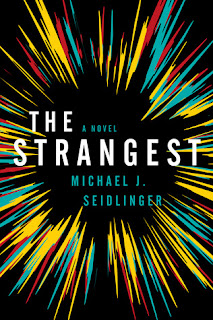THE STRANGEST
MICHAEL J. SEIDLINGER
O/R Books
$17.00 trade paper, available now
Rating: 4.5* of five
The Publisher Says: Michael Seidlinger has dared tackle one of the literary classics of the 20th century literature and reimagined it for the 21st: and in Albert Camus’ anti-hero Meursault, at once apathetic and violent, unable to connect with his fellow humans, Seidlinger exhumes a perfect metaphor for the Internet Generation. Zachary Weinham, anchorless in terms of morals and committed to nothing except commenting on comments and their comments etc., finds himself involved in the sinister machinations of Rios, someone he meets in a bar, and allows himself to be set up—whether out of apathy or a desire for self-destruction it’s hard to tell. A murder ensues. Shunned by his friends and associates, not sure of what he has gotten into, Zachary heads for confrontation with society—and his own moral values.
I RECEIVED A DRC FROM THE PUBLISHER VIA EDELWEISS+. THANK YOU.
My Review: Routine blog readers will recall Michael Seidlinger's name. The Fun We've Had was 2014's 6-stars-of-five read; Mother of a Machine Gun, a novella deconstructing Identity and Motherhood from a son's perspective; Falter Kingdom, Anybody Home?, all of them four star-plus reads for me. This book's appeal to me wasn't as immediate or as visceral as the other reads were. I'm somewhat trapped in Meursault's Otherness via Camus. Exploring his identity further didn't necessarily strike me as urgent, and there's nothing Michael Seidlinger creates that stops short of Urgency.
I've said of him before:
Every writer needs a trope. Seidlinger's is musical brevity. He'd be called a poet if he made less sense.
–and–
Seidlinger is what a mating between Djuna Barnes and Samuel Beckett would've produced: Illusionless in his pessimism, joyful in his schadenfreude, and both human and humane enough to wrap his bitter pills in pretty words.
I stand by those words, I believe them to be fair in their assessment of his talent and his presentation of it. So this book? It came out almost a decade ago and...I wasn't a fan, exactly, because...well...Meursault.
In my never-ending quest to tie up loose ends, since I can't tie Michael up but *can* finish reviewing the DRCs of his work that I have, I thought a real review of this book to end 2022 would feel condign.
When taking on classics, there are two ways to approach them from a positive energy field: Hommage or retelling. Leave it to a poet to say, "naaah," and enter into a dialogue with the piece. The Stranger, subject of Camus's astonishing and ever-fresh novella of Meursault's crime and punishment, is now about Zachary, The Strangest...the man, like Guy is to Bruno from Strangers on a Train, whose blankness is observing the surfaces of a mediated landscape with no concrete referents. Only what is outside The Strangest is real. This, of course, means he has no reality because his internal world is only the external world reflected on the shiny, frictionless surfaces of his many mirrors. Like a human Hubble Space Telescope, he has only the visible light of distant, unreachable reality to furnish meaning and encourage existence.
What makes that so dangerous is visible in the social-media obsessed, whipped to a froth "activism" and "radicalization" of many, many empty shells with AR-15s. Nothing outside can give a person a core, as Camus made plain in Meursault's completely avoidable descent into murder. And here, though it's framed by a modern concern unknown to the Camus of 1944, we're going down the same rabbit-hole. No core? Barely a shell! Constantly obsessed with fitting in, The Strangest isn't ever going to achieve that.
"For a line to exist, it would first have to be crossed."
You can't fit if you have no shape.
And that is the thing, in 2015, Michael Seidlinger saw and said that, to my slight embarrassment, I did not pay enough attention to. The way that Meursault would go along the hot and sandy beach in Algeria to get along was fundamentally different from The Strangest's endlessly, heatlessly reflective but never reflexive attempts to build Reality from the weak material of light. There is no real reason not to murder someone, a lot of someones in fact, if there is no texture or heft to the world for you. It's light, from a screen or from a geometric solid, it's only light and therefore has only the meaning your analysis gives it.
If light and its shadows are all you possess, there is no reason to obsess over life and fate and pain and grief. Death is only the light going out, only the local light covered or extinguished. Light still exists. Shadows and darkness aren't real.
Maybe one of the most chilling meditations I've read in 2022. I can't call it perfect...it's cold and disconnected, so doesn't make the impact something so impartant should...but I can call it excellent. Highly recommended for serious thinkers about twenty-first century life and society.

No comments:
Post a Comment
Note: Only a member of this blog may post a comment.